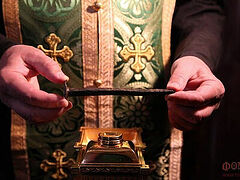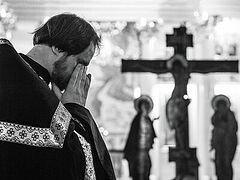St. Justin of Ufa and Menzelinsk was ordained to the priesthood in September 1853. His wife died in 1862, and he was tonsured into monasticism in June 1863. He served at various monasteries and seminaries, and on January 27, 1885, he was consecrated Bishop of Mikhailovsk, vicar of the Ryazan Diocese. He served in a number of dioceses, and on October 14, 1896, he was appointed Bishop of Ufa and Menzelinsk. He retired in 1900 and spent the rest of his life until his peaceful repose on September 26, 1903, in monastic reclusion. In 1988, he was glorified as a locally venerated saint in the Synaxis of Crimean Saints.
Ye have heard that it hath been said, An eye for an eye, and a tooth for a tooth: But I say unto you, That ye resist not evil: but whosoever shall smite thee on thy right cheek, turn to him the other also. And if any man will sue thee at the law, and take away thy coat, let him have thy cloak also. And whosoever shall compel thee to go a mile, go with him twain. Give to him that asketh thee, and from him that would borrow of thee turn not thou away (Mt. 5:38–42). This, according to the interpretation of St. John Chrysostom, is a high Christian philosophy, the first step of which is to not get offended; the second is that when it’s already happened—to not repay the offending person with equal evil; the third is to not only not do to your offender what you’ve suffered from him, but also to remain calm; the fourth is to commit yourself to enduring adversity; the first is to give more than your offender wants to take; the sixth is to not hate him; the seventh is to even love him; the eighth is to do him good; the ninth is to pray for him, as is said in the following commandment (see St. John Chrysostom’s interpretation of the Gospel of Matthew).
Love your enemies, bless them that curse you, do good to them that hate you, and pray for them which despitefully use you, and persecute you; That ye may be the children of your Father Which is in Heaven: for he maketh his sun to rise on the evil and on the good, and sendeth rain on the just and on the unjust (Mt. 5:44-45). But love ye your enemies, and do good, and lend, hoping for nothing again; and your reward shall be great, and ye shall be the children of the Highest: for He is kind unto the unthankful and to the evil (Lk. 6:35). He who loves his enemy is a kind of miracle worker, says St. Dmitry of Rostov. It turns beasts into meek lambs. Enemies bring us great benefits, for they watch after our shortcomings and make us cautious and more perfect; and with their tongues they cleanse us from sins.
On almsgiving
Take heed that ye do not your alms before men, to be seen of them: otherwise ye have no reward of your Father Which is in Heaven. Therefore when thou doest thine alms, do not sound a trumpet before thee, as the hypocrites do in the synagogues and in the streets, that they may have glory of men. Verily I say unto you, They have their reward. But when thou doest alms, let not thy left hand know what thy right hand doeth: That thine alms may be in secret: and thy Father Which seeth in secret Himself shall reward thee openly (Mt. 6:1–4). With this and the following two commandments, the Lord destroys the passion of vanity—a passion all the more dangerous because it secretly lurks in the souls even of otherwise pious people, and all the good that’s there silently dissipates and imperceptibly departs.
On prayer
And when thou prayest, thou shalt not be as the hypocrites are: for they love to pray standing in the synagogues and in the corners of the streets, that they may be seen of men. Verily I say unto you, They have their reward. But thou, when thou prayest, enter into thy closet, and when thou hast shut thy door, pray to thy Father Which is in secret; and thy Father Which seeth in secret shall reward thee openly. But when ye pray, use not vain repetitions, as the heathen do: for they think that they shall be heard for their much speaking. Be not ye therefore like unto them: for your Father knoweth what things ye have need of, before ye ask Him. After this manner therefore pray ye: Our Father Which art in Heaven, Hallowed be Thy name. Thy Kingdom come, Thy will be done in earth, as it is in Heaven. Give us this day our daily bread. And forgive us our debts, as we forgive our debtors. And lead us not into temptation, but deliver us from evil: For Thine is the Kingdom, and the power, and the glory, for ever. Amen (Mt. 6:5–13). For if ye forgive men their trespasses, your Heavenly Father will also forgive you: But if ye forgive not men their trespasses, neither will your Father forgive your trespasses, the Lord added in explanation of the fifth petition of the Lord’s Prayer. St. Dmitry of Rostov has a wonderful teaching on prayer in his book The Inner Man Who Prays in Secret. And the Lord’s Prayer is explained in the teaching of St. Tikhon of Zadonsk in the book, On Prayer, or the Invocation of God. Also see, Teaching on the Lord’s Prayer, published by St. Panteleimon’s Monastery on Mt. Athos in 1898.
On fasting
But thou, when thou fastest, anoint thine head, and wash thy face; That thou appear not unto men to fast, but unto thy Father Which is in secret: and thy Father, Which seeth in secret, shall reward thee openly (Mt. 6:17–18). The Lord commands us to give alms, to pray, and to fast in secret, warning us against our sinister inclination to comfort ourselves and enjoy human praise, fearing that this inclination, carefully concealed, not only from men, but even from ourselves, might lead us to pharisaic hypocrisy, which is content with human praise—not caring and not thinking about our Heavenly Father’s reward. It’s clear how offensive this is to God and how destructive for us!
On hoping in God and surrendering oneself to His will
Therefore take no thought, saying, What shall we eat? or, What shall we drink? or, Wherewithal shall we be clothed? (For after all these things do the Gentiles seek:) for your Heavenly Father knoweth that ye have need of all these things. But seek ye first the Kingdom of God, and his righteousness; and all these things shall be added unto you. Take therefore no thought for the morrow: for the morrow shall take thought for the things of itself. Sufficient unto the day is the evil thereof (Mt. 6:31–34). To gather both earthly and Heavenly treasure at the same time is irrational and incompatible. It’s irrational to gather earthly treasures because they often perish: to gather the former and the latter together is incompatible because the heart can’t bifurcate itself—it will surely cling to either the Heavenly or the earthly; just as it’s impossible to serve two masters at the same time, because the servant will certainly come to love one master and begin to neglect the other.
Moreover, if the heart of man clings to the treasures of the earth, then the eye of the mind will darken, and everything will be dark for him; whereas the heart that loves Heavenly treasures will make the eye of its mind bright, and everything will be light for him. There must be only one thing there, for it’s impossible to serve both God and mammon. Taking care to gather food, drink, and clothing for many years is a sign of a lack of intelligence and lack of faith, which is offensive to God, Who so richly feeds us all—even the smallest creation living in the universe; even all the plants, down to the grass of the field He so luxuriously adorns! It turns out that a Christian who believes and hopes in God must direct all his cares mainly to the search for the Kingdom of God and His righteousness; and everything else that’s necessary will be provided for him by God the Father and His providence.
On not condemning others
Judge not, that ye be not judged. For with what judgment ye judge, ye shall be judged: and with what measure ye mete, it shall be measured to you again (Mt. 7:1–2). Righteous judgment is the work of God, not man: Whoever condemns another delights in the judgment of God, and moreover distorts it—he almost always judges incorrectly. “When you condemn another, you condemn not him,” says St. John Chrysostom, “but yourself, and you subject yourself to the fearful judgment and severe torment.” And how will you begin to heal another when you’re in greater need of healing than him?! He who is guilty of the same thing mustn’t judge; he doesn’t care at all about correcting himself and others.
On treating others as ourselves
Therefore all things whatsoever ye would that men should do to you, do ye even so to them: for this is the Law and the Prophets (Mt. 7:12). This is a universal commandment about mutual relations between people. In conforming ourselves to this commandment, we as humans know what we must do for others. So, if we want people to do good to us, then we ourselves must do good; if we want everyone to love us, then we ourselves must love everyone; and in general, what we don’t love ourselves, we mustn’t do to others. By this commandment, Christ the Savior showed that the divine teaching about virtue in general is both brief and easy to fulfill, because it’s close to us by nature and is known to all, so none can justify themselves by claiming ignorance.
On non-acquisitiveness
Take heed, and beware of covetousness: for a man's life consisteth not in the abundance of the things which he possesseth (Lk. 12:15). This commandment is explained by the Lord with the parable of the rich man who had a good harvest, and he settled down for many years to live a life of pleasure: to drink, eat, and fare sumptuously all day; but in the midst of taking care to gather and store a rich harvest, he suddenly died, and was rightly called foolish by the Lord.
On vigilance
Let your loins be girded about, and your lights burning; And ye yourselves like unto men that wait for their lord, when he will return from the wedding; that when he cometh and knocketh, they may open unto him immediately. Blessed are those servants, whom the lord when he cometh shall find watching… Be ye therefore ready also: for the Son of Man cometh at an hour when ye think not (Lk. 12:35–37, 40). Watch ye therefore: for ye know not when the master of the house cometh, at even, or at midnight, or at the cockcrowing, or in the morning: Lest coming suddenly he find you sleeping. And what I say unto you I say unto all, Watch (Mk. 13:35–37). This most important of commandments is explained in the Gospels of Luke (Lk. 12:40–59) and Matthew (Mt. 24:42–51).
On patience
In your patience possess ye your souls (Lk. 21:19). But he that shall endure unto the end, the same shall be saved (Mt. 24:13).
Unshakable patience consists in that a man not only doesn’t get irritated, doesn’t get angry, doesn’t indulge in faint-hearted murmuring, but endures everything bitter, sorrowful, and painful in his life with humility and self-condemnation, as if standing before the Most High Judge and accepting torture from Him for his sins.
All Christian ascetic labors and virtues are accomplished and completed in patience. Without patience, nothing good, especially something difficult, and nothing at all in ordinary life can be done without patience; especially in the Christian life, not even a step can be made without patience.
But how can we learn patience? We have to decide, with the help of God, to endure everything that happens to us silently, without murmuring, waiting for a change for the better. The experiences of life will teach and show us how patience is necessary, useful, and beneficial for us in all respects; and having learned this, a man will no longer part with patience; he’ll get accustomed to it, and, finally, will sense that with patience it’s easier to endure all the hardships of life, especially Christian ascetic labors, and reach a quiet haven where there is neither sickness, nor sorrow, nor sighing. How freely, how gratifyingly, how happily he will sigh then, having crossed the stormy sea of life, filled with many troubles—when all his qualities and virtues, his complete love for God, deep humility, heartfelt obedience to the Law of God, complete devotion to the will of God, the purity of heart and soul so dear to God, true love for others, and in general, his wholehearted desire to fulfill the commandments of Christ will be preserved and shaped in him by patience that can’t be shaken by anything! The Lord Himself and all the saints are examples of patience.
To be continued…






